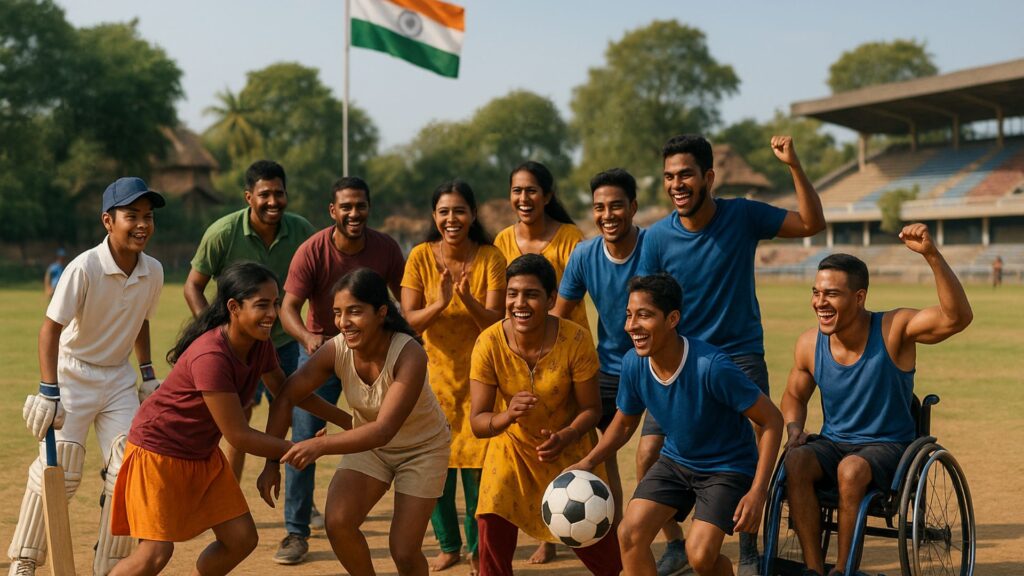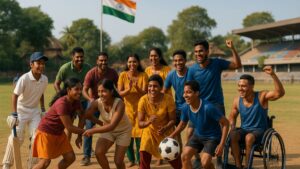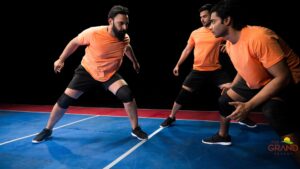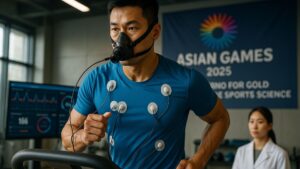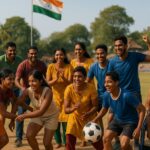Have you ever felt that electric thrill of a packed stadium, the collective gasp at a near miss, or the unifying roar of victory? Sports, in its purest form, is more than just a physical activity; it’s a powerful language that transcends boundaries, a shared experience that can knit the most diverse threads of society into a single, vibrant tapestry. In a nation as rich and varied as India, with its myriad cultures, languages, and traditions, sports emerges not just as a pastime, but as a potent catalyst for profound social change and genuine inclusion.
The Undeniable Power of Play: More Than Just a Game
Think about it for a second. When the whistle blows, and the game begins, do the lines of caste, religion, or economic status really matter on the field? For those intense moments, the shared goal, the collective effort, and the pursuit of victory become the paramount concerns. This inherent levelling effect of sports holds immense potential for fostering a more equitable and inclusive society.
Building Bridges: How Sports Connect Diverse Communities
Imagine a cricket match in a small village. You’ll likely find people from all walks of life, cheering for the same team, celebrating every boundary and wicket together. Sports provides a common ground, a neutral territory where individuals from different backgrounds can interact, collaborate, and build relationships based on shared passion rather than social divisions. It’s in these moments of collective joy and even shared disappointment that the walls we often build around ourselves start to crumble. Just like different instruments coming together to create a harmonious melody, diverse individuals uniting through sports create a powerful symphony of camaraderie.
Challenging Stereotypes: Breaking Down Prejudices on the Field
How many times have you seen someone defy expectations in a sport? A young woman from a rural background shattering records in athletics, a differently-abled athlete showcasing incredible skill in para-sports, or individuals from marginalized communities leading their teams to victory. These are not just sporting achievements; they are powerful statements that challenge deeply ingrained stereotypes and prejudices. Every time an athlete overcomes adversity and excels, they send a ripple of inspiration, proving that talent and determination know no social barriers. It’s like watching a seed push through concrete – a testament to the inherent strength and potential that exists everywhere, waiting for an opportunity to blossom.
Inclusion in Action: Sports Initiatives Making a Difference
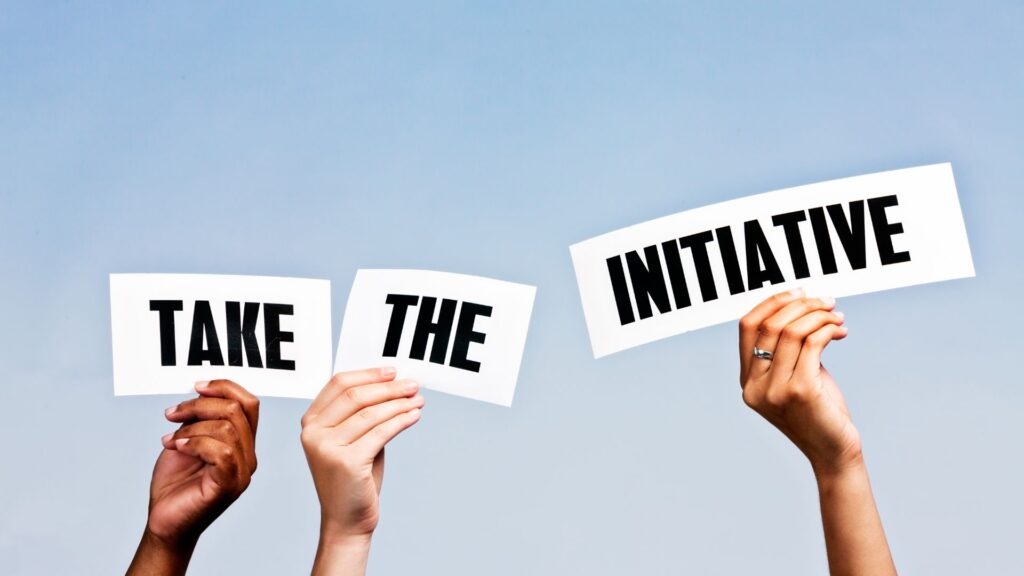
Across India, numerous initiatives are harnessing the transformative power of sports to foster inclusion and empower marginalized communities. These efforts, often driven by passionate individuals, NGOs, and government bodies, are creating real and tangible change on the ground.
Empowering Marginalized Groups: Giving a Voice Through Sports
Sports can be a powerful tool for empowerment, providing individuals who are often excluded from mainstream society with a sense of belonging, self-worth, and agency.
Gender Equality: The Rise of Women in Indian Sports
Remember the iconic moment when the Indian women’s hockey team made their mark on the global stage? Or the inspiring journeys of our female wrestlers, boxers, and cricketers who have broken societal norms and achieved international acclaim? Sports has played a significant role in challenging patriarchal structures and empowering women in India. It provides them with opportunities for physical and mental development, economic independence, and a platform to become role models for future generations. It’s like a blooming flower, pushing past the restrictive soil to reach for the sunlight of opportunity.
Disability Inclusion: Leveling the Playing Field
Para-sports in India are not just about athletic competition; they are a powerful movement advocating for the rights and inclusion of persons with disabilities. The incredible achievements of our para-athletes are shattering misconceptions about what individuals with disabilities can achieve. Sports provides them with a platform to showcase their abilities, build confidence, and inspire a more inclusive and accessible society. Think of it as removing the hurdles on a track, allowing every runner to compete on equal footing.
Caste and Community: Fostering Harmony Through Teamwork
In a society historically marked by caste-based discrimination, sports offers a unique space for individuals from different castes and communities to come together as equals. The shared objective of winning, the reliance on each other’s strengths, and the collective celebration of success can help break down social barriers and foster a sense of unity and mutual respect. On the field, your teammate’s skill matters more than their surname. It’s like different colors blending in a painting, creating a richer and more beautiful artwork.
Grassroots Movements: Cultivating Change from the Ground Up
The real magic often happens at the grassroots level, where dedicated individuals and organizations are using sports to transform lives and communities from the inside out.
Local Heroes: Inspiring Stories of Transformation
Across India, there are countless stories of individuals who have used sports to overcome adversity, uplift their communities, and become beacons of hope. These local heroes, often working with limited resources, are proving that passion and dedication can indeed spark significant social change. They are like the small streams that eventually converge to form a mighty river, each contributing to a larger flow of positive transformation.
Government and NGO Collaborations: A United Front for Change
The impact of sports for social change is amplified when government bodies and non-governmental organizations work together. Government initiatives can provide infrastructure and resources, while NGOs often have deep community connections and specialized expertise in working with marginalized groups. This synergy creates a powerful force for driving inclusive development through sports. It’s like a well-oiled machine, with different parts working in coordination to achieve a common goal.
The Economic and Social Ripple Effect of Sports
The benefits of promoting sports for social change extend far beyond just social cohesion. They create significant economic opportunities and contribute to the overall well-being of individuals and communities.
Creating Opportunities: Sports as a Pathway to Livelihood
The sports industry in India is growing rapidly, creating a wide range of employment opportunities, from professional athletes and coaches to administrators, marketers, and event managers. Investing in sports infrastructure and training programs can provide viable career paths for young people, especially those from disadvantaged backgrounds, offering them a chance for economic empowerment and a brighter future. Think of it as planting seeds that grow into trees bearing the fruits of opportunity.
Health and Well-being: The Holistic Benefits of an Active Lifestyle
Beyond the social and economic advantages, participation in sports has profound physical and mental health benefits. It promotes an active lifestyle, reduces the risk of chronic diseases, improves mental well-being, and fosters discipline and resilience. Encouraging sports participation, especially among young people, contributes to a healthier and more productive society. It’s like giving someone the tools to build a strong foundation for a healthy and fulfilling life.
National Pride and Identity: Uniting a Nation Through Sporting Achievements
Remember the collective euphoria when India wins a major sporting event? It’s a moment when the entire nation comes together, united by a shared sense of pride and identity. Sporting achievements can transcend regional and cultural differences, fostering a stronger sense of national unity and belonging. It’s like a national anthem that resonates in the hearts of every citizen, regardless of their background.
Overcoming Challenges: The Road Ahead for Inclusive Sports in India
While the potential of sports for social change is immense, there are still significant challenges that need to be addressed to ensure that its benefits reach all sections of society.
Addressing Systemic Barriers: What Needs to Change?
Despite the progress made, systemic barriers such as lack of access to infrastructure, inadequate funding for grassroots sports, and social discrimination still hinder the participation of many marginalized groups. Addressing these deep-rooted issues requires a multi-pronged approach involving policy changes, increased investment, and a conscious effort to dismantle discriminatory practices. It’s like clearing the path of obstacles to ensure everyone has a fair chance to reach the finish line.
The Role of Education and Awareness: Cultivating a Culture of Inclusion
Creating a truly inclusive sporting culture requires more than just providing opportunities; it necessitates a shift in attitudes and mindsets. Education and awareness campaigns can play a crucial role in challenging prejudices, promoting respect for diversity, and highlighting the importance of inclusion in sports and society at large. It’s about planting the seeds of understanding and empathy in the hearts and minds of people.
Sustainable Development Goals: Sports as a Contributor to Progress
The United Nations’ Sustainable Development Goals (SDGs) recognize the important role of sports in achieving peace, development, and a more equitable world. Promoting inclusive sports in India directly contributes to several SDGs, including reducing inequalities, promoting gender equality, and fostering healthy lives and well-being. It’s like sports becoming a vital cog in the larger machinery of global progress.
The Future of Sports for Social Change in India: A Vision of Equality
Looking ahead, the potential for sports to drive social change and inclusion in India is only set to grow, fueled by technological advancements, inspiring role models, and a growing recognition of its transformative power.
Technological Advancements: Enhancing Accessibility and Engagement
Technology can play a significant role in making sports more accessible and engaging for everyone. From live streaming of para-sports events to virtual training programs for athletes in remote areas, technology can break down geographical and physical barriers to participation and viewership. It’s like using a digital bridge to connect people to the world of sports, regardless of their location or abilities.
The Power of Role Models: Inspiring the Next Generation
The achievements and stories of athletes from diverse backgrounds serve as powerful sources of inspiration for young people. When children see individuals who look like them, or who have overcome similar challenges, achieving success in sports, it instills in them the belief that they too can achieve their dreams. These role models are like guiding stars, showing the path to aspiration and achievement.
How You Can Be Part of the Movement
The journey towards a more inclusive and equitable India through sports is a collective one. Whether you are a policymaker, an educator, a coach, an athlete, or simply a sports enthusiast, there are numerous ways you can contribute to this movement. Support local sports initiatives, advocate for inclusive policies, challenge discriminatory attitudes, and celebrate the achievements of athletes from all backgrounds. Every small action can contribute to a larger wave of change. It’s like each drop of water contributing to the vastness of the ocean.
Inspiring Quotes on Sports and Social Change
“Sport has the power to change the world. It has the power to inspire. It has the power to unite people in a way that little else does. It speaks to youth in a language they understand.” – Nelson Mandela
“The miracle isn’t that I finished. The miracle is that I had the courage to start.” – John Bingham
“It is by acts and not by ideas that people live.” – Anatole France (Relating to the active participation in sports)
“Inclusivity means not ‘just we’re allowed to be there,’ but ‘we are valued there.'” – Mia Mingus (Highlighting the importance of genuine inclusion in sports)
“Alone we can do so little; together we can do so much.” – Helen Keller (Emphasizing the collaborative nature of building an inclusive sporting culture)
Conclusion: Embracing the Transformative Potential of Sports
Sports in India is far more than just a source of entertainment; it is a powerful force for social good. By breaking down barriers, fostering inclusion, empowering marginalized communities, and promoting unity, sports has the potential to transform India into a more equitable and harmonious society. Embracing and investing in the transformative power of play is not just about winning medals; it’s about building a better future for all.
Frequently Asked Questions (FAQs)
- How does sports participation help in breaking down social barriers in India? Sports provides a neutral platform where individuals from diverse backgrounds interact based on shared goals and passion, fostering camaraderie and breaking down prejudices related to caste, religion, and economic status.
- What are some examples of successful sports initiatives promoting inclusion in India? Numerous grassroots movements and collaborations between government and NGOs focus on empowering marginalized groups through sports, including initiatives promoting women’s participation, para-sports for persons with disabilities, and community-based sports programs in underserved areas.
- What role do female athletes play in driving social change in India? Female athletes challenge patriarchal norms, inspire young girls, and serve as powerful role models, demonstrating that women can achieve greatness in any field and contributing to gender equality.
- How can technology contribute to making sports more inclusive in India? Technology can enhance accessibility through live streaming of events, virtual training programs, and platforms that connect athletes and fans from diverse backgrounds, overcoming geographical and physical limitations.
- What can individuals do to support the use of sports for social change and inclusion in India? Individuals can support local sports initiatives, advocate for inclusive policies, challenge discriminatory attitudes, celebrate the achievements of diverse athletes, and promote the values of sportsmanship and respect in their communities.

